Gebhard Leberecht von Blücher
| Gebhard Leberecht von Blücher | |
|---|---|
.jpg) Blücher as he appeared (ca. 1815–1819) | |
| Nickname(s) | Marschall Vorwärts |
| Born |
16 December 1742 Rostock, Duchy of Mecklenburg-Schwerin |
| Died |
12 September 1819 (aged 76) Krieblowitz, Silesia Province (now Krobielowice in Poland) |
| Allegiance |
|
| Service/branch | Prussian Army |
| Years of service | 1758–1815 |
| Rank |
|
| Battles/wars |
Seven Years' War French Revolutionary Wars Napoleonic Wars |
| Awards |
Star of the Grand Cross of the Iron Cross Pour le Mérite Iron Cross Order of St. George Military William Order |
Gebhard Leberecht von Blücher, Fürst von Wahlstatt (German pronunciation: [ˈɡɛphaɐ̯t ˈleːbəʁɛçt fɔn ˈblʏçɐ]; 16 December 1742 – 12 September 1819), Graf (count), later elevated to Fürst (sovereign prince) von Wahlstatt, was a Prussian Generalfeldmarschall (field marshal). He earned his greatest recognition after leading his army against Napoleon I at the Battle of the Nations at Leipzig in 1813 and the Battle of Waterloo in 1815.
Blücher was born in Rostock, the son of a retired army captain. His military career began in 1758 as a hussar in the Swedish Army. He was captured by the Prussians in 1760 during the Pomeranian Campaign and thereafter joined the Prussian Army, serving as a hussar officer for Prussia during the remainder of the Seven Years' War. In 1773, Blücher was forced to resign by Frederick the Great for insubordination. He worked as a farmer until the death of Frederick in 1786, when Blücher was reinstated and promoted to colonel. For his success in the French Revolutionary Wars, Blücher became a major general in 1794. He became a lieutenant general in 1801 and commanded the cavalry corps during the Napoleonic Wars in 1806.
War broke out between Prussia and France again in 1813 and Blücher returned to active service at the age of 71. He was appointed full general over the Prussian field forces and clashed with Napoleon at the Battles of Lützen and Bautzen. Later he won a critical victory over the French at the Battle of Katzbach. Blücher commanded the Prussian Army of Silesia at the Battle of the Nations where Napoleon was decisively defeated. For his role, Blücher was made a field marshal and received his title of Prince of Wahlstatt. After Napoleon’s return in 1815, Blücher took command of the Prussian Army of the Lower Rhine and coordinated his force with that of the British and Allied forces under the Duke of Wellington. At the Battle of Ligny, he was severely injured and the Prussians retreated. After recovering, Blücher resumed command and joined Wellington at the Battle of Waterloo, with the intervention of Blücher's army playing a decisive role in the final allied victory.
Blücher was made an honorary citizen of Berlin, Hamburg and Rostock. Known for his fiery personality, he was nicknamed Marschall Vorwärts ("Marshal Forward") by his soldiers because of his aggressive approach in warfare.[1] Along with Paul von Hindenburg, he was the highest-decorated Prussian-German soldier in history: Blücher and Hindenburg are the only German military officers to have been awarded the Star of the Grand Cross of the Iron Cross.
Biography
Early life
Blücher was born on 16 December 1742 in Rostock in the Duchy of Mecklenburg-Schwerin, a Baltic port in northern Germany.[2] His father was a retired army captain, and his family had been landowners in northern Germany since at least the 13th century.[3]
He began his military career at the age of sixteen,[lower-alpha 1] when he joined the Swedish Army as a hussar.[1] At the time, Sweden was at war with Prussia in the Seven Years' War. Blücher took part in the Pomeranian campaign of 1760, where Prussian Hussars captured him in a skirmish. The colonel of the Prussian regiment, Wilhelm Sebastian von Belling (a distant relative), was impressed with the young hussar and had him join his own regiment.[2][1]
Blücher took part in the later battles of the Seven Years' War and as a hussar officer gained much experience in light cavalry work. In peace, however, his ardent spirit led him into excesses of all kinds, such as the mock execution of a priest suspected of supporting Polish uprisings in 1772. Due to this, he was passed over for promotion to Major. Blücher sent in a rude letter of resignation in 1773, to which Frederick the Great replied: "Captain Blücher can take himself to the devil" (1773).[2]
Blücher settled down to farming; within fifteen years, he had acquired independence and had become a member of the Freemasons. During the lifetime of Frederick the Great, Blücher could not return to the army; but the king died in 1786, and Blücher was reinstated as a major in his old regiment, the Red Hussars, in 1787. He took part in the expedition to the Netherlands in 1787, and the following year was promoted to lieutenant colonel. In 1789, he received Prussia's highest military order, the Pour le Mérite, and in 1794 he became colonel of the Red Hussars. In 1793 and 1794, he distinguished himself in cavalry actions against the French, and for his success at Kirrweiler (28 May 1794) was promoted to major general. In 1801, he received promotion to lieutenant general.[2]
Napoleonic Wars
.jpg)
Blücher was one of the leaders of the war party in Prussia in 1805–1806 and served as a cavalry general in the disastrous campaign of the latter year. At the double Battle of Jena-Auerstedt, Blücher fought at Auerstedt, repeatedly charging at the head of the Prussian cavalry but too early and without success. In the retreat of the broken armies he commanded the rearguard of Frederick Louis, Prince of Hohenlohe-Ingelfingen corps.[2] Upon the capitulation of the main body after the Battle of Prenzlau on 28 October,[2] he found his progress toward the north-east blocked.[1] He led a remnant of the Prussian army away to the north-west,[2] after having secured 34 cannon in co-operation with Gerhard von Scharnhorst.[1] At the Battle of Lübeck his force was defeated[2] by two French corps on 6 November. The next day, trapped against the Danish frontier by 40,000 French troops, he was compelled to surrender with 7,800 soldiers at Ratekau.[1] Blücher insisted that clauses be written in the capitulation document that he had had to surrender due to lack of provisions and ammunition,[2] and that his soldiers should be honoured by a French formation along the street. He was allowed to keep his sabre and to move freely, bound only by his word of honour,[1] and was soon exchanged for future Marshal Claude Victor-Perrin, duc de Belluno, and was actively employed in Pomerania, at Berlin, and at Königsberg until the conclusion of the war.[2]
After the war, Blücher was looked upon as the natural leader of the Patriot Party, with which he was in close touch during the period of Napoleonic domination. But his hopes of an alliance with Austria in the war of 1809 were disappointed. In this year he was made general of cavalry. In 1812 he expressed himself so openly on the alliance of Russia with France that he was recalled from his military governorship of Pomerania and virtually banished from the court.[2]
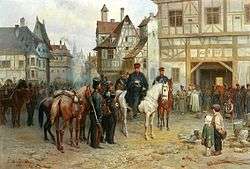
Following the start of the War of Liberation in the Spring of 1813, Blücher was again placed in high command, and he was present at Lützen and Bautzen. During the Summer truce, he worked on the organisation of the Prussian forces; when the war was resumed, he became commander-in-chief of the Army of Silesia, with August von Gneisenau and Karl von Müffling as his principal staff officers and 40,000 Prussians and 50,000 Russians under his command during the Autumn Campaign the most conspicuous military quality displayed by Blücher was his unrelenting energy.[2]
The irresolution and divergence of interests usual in Sixth Coalition armies found in him a restless opponent. Knowing that if he could not induce others to co-operate he was prepared to attempt the task at hand by himself which often caused other generals to follow his lead. He defeated Marshal MacDonald at the Katzbach, and by his victory over Marshal Marmont at Möckern led the way to the decisive defeat of Napoleon at the Battle of the Nations at Leipzig. Blücher's own army stormed Leipzig on the evening of the last day of the battle.[2] This was the fourth battle between Napoleon and Blücher, and the first that Blücher had won.
On the day of Möckern (16 October 1813) Blücher was made a field marshal, and after the victory he pursued the French with his accustomed energy. In the winter of 1813–1814 Blücher, with his chief staff officers, was mainly instrumental in inducing the Coalition sovereigns to carry the war into France itself.[2]
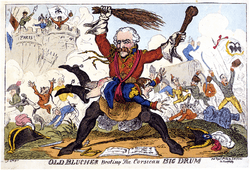
The Battle of Brienne and the Battle of La Rothière were the chief incidents of the first stage of the celebrated 1814 campaign in north-east France, and they were quickly followed by victories of Napoleon over Blücher at Champaubert, Vauchamps, and Montmirail. But the courage of the Prussian leader was undiminished, and his victory against the vastly outnumbered French, at Laon (9 and 10 March) practically decided the fate of the campaign.[2] However, his health had been severely affected by the strains of the previous two months, and he now suffered a breakdown which "revealed the fragility of the coalition armies' command structure and just how much the Army of Silesia had depended on Blücher's drive, courage and charisma.... The result was that for more than a week after the battle of Laon the Army of Silesia... played no useful role in the war".[4]
After this, Blücher infused some of his energy into the operations of the Prince Schwarzenberg's Army of Bohemia, and at last this army and the Army of Silesia marched in one body directly towards Paris. The victory of Montmartre, the entry of the allies into the French capital, and the overthrow of the First Empire were the direct consequences.[2]
Blücher was inclined to punish the city of Paris severely for the sufferings of Prussia at the hands of the French armies, but the allied commanders intervened. Blowing up the Jena Bridge near the Champ de Mars[2] was said by the Duke of Wellington to have been one of his contemplated acts:
About blowing up the bridge of Jena there were two parties in the Prussian Army—Gneisenau and Muffling against, but Blucher violently for it. In spite of all I could do, he did make the attempt, even while I believe my sentinel was standing at one end of the bridge. But the Prussians had no experience of blowing up bridges. We, who had blown up so many in Spain, could have done it in five minutes. The Prussians made a hole in one of the pillars, but their powder blew out instead of up, and I believe hurt some of their own people.[5]
In gratitude for his victories in 1814, King Frederick William III of Prussia created Blücher Prince of Wahlstatt (in Silesia on the Katzbach battlefield).[2][lower-alpha 2] The king also awarded him estates near Krieblowitz (now Krobielowice, Poland) in Lower Silesia and a grand mansion at 2, Pariser Platz in Berlin (which in 1930 became the Embassy of the United States, Berlin). Soon afterward Blücher paid a visit to England, where he was received with royal honors and cheered enthusiastically everywhere he went.[2]
Hundred Days and later life
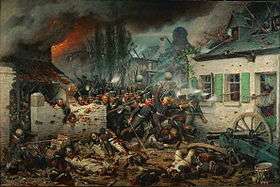
After the war Blücher retired to Silesia, but the return of Napoleon from Elba and his entry into Paris at the start of the Hundred Days, soon called him back to service. He was put in command of the Army of the Lower Rhine, with General August von Gneisenau as his chief of staff. At the outset of the Waterloo Campaign of 1815 the Prussians sustained a serious defeat at Ligny (16 June), in the course of which the old field marshal lay trapped under his dead horse for several hours and was repeatedly ridden over by cavalry, his life only saved by the devotion of his aide-de-camp Count Nostitz, who threw a greatcoat over his commander, in order to obscure Blücher's rank and identity from the passing French. As Blücher was unable to resume command for some hours Gneisenau took command, drew off the defeated army and rallied it.[2] In spite of Gneisenau's distrust of Wellington, he obeyed Blücher's last orders to direct the army's retreat towards Wavre, rather than Liege, in order to keep alive the possibility of joining the Prussian and Wellington's Anglo-allied armies together.[6]
After bathing his wounds in a liniment of rhubarb and garlic, and fortified by a liberal internal dose of schnapps, Blücher rejoined his army. Gneisenau feared that the British had reneged on their earlier agreements and favored a withdrawal, but Blücher convinced him to send two Corps to join Wellington at Waterloo.[7][8] He then led his army on a tortuous march along muddy paths, arriving on the field of Waterloo in the late afternoon. In spite of his age, the pain of his wounds, and the effort it must have taken for him to remain on horseback, Bernard Cornwell states that several soldiers attested to Blücher's high spirits and his determination to beat Napoleon:
"Forwards!" he was quoted as saying. "I hear you say it's impossible, but it has to be done! I have given my promise to Wellington, and you surely don't want me to break it? Push yourselves, my children, and we'll have victory!" It is impossible not to like Blücher. He was seventy-four years old, still in pain and discomfort from his adventures at Ligny, still stinking of schnapps and of rhubarb liniment, yet he is all enthusiasm and energy. If Napoleon's demeanour that day was one of sullen disdain for an enemy he underestimated, and Wellington's a cold, calculating calmness that hid concern, then Blücher is all passion.[9]

With the battle hanging in the balance Blücher's army intervened with decisive and crushing effect, his vanguard drawing off Napoleon's badly needed reserves, and his main body being instrumental in crushing French resistance. This victory led the way to a decisive victory through the relentless pursuit of the French by the Prussians. The two Coalition armies entered Paris on 7 July.[2]
Prince Blücher remained in the French capital for a few months, but his age and infirmities compelled him to retire to his Silesian residence at Krieblowitz.[2] At the invitation of the British government, he made another state visit to England, to be formally thanked for his and his army's role in the Waterloo Campaign. When his carriage stopped on Blackheath hill, overlooking London, he is said to have exclaimed, "What a city to sack!"[10] He died at Krieblowitz on 12 September 1819, aged 77.[2] After his death, an imposing mausoleum was built for his remains.
Assessment
According to his biography in the Encyclopædia Britannica Eleventh Edition, Blucher retained, to the end of his life, the wildness and tendency to excesses which had caused his dismissal from the army in his youth, but these faults sprang from an ardent and vivid temperament which made him a leader of people. While by no means a military genius, his sheer determination and ability to spring back from errors made him a competent leader.[2]
Campaigns
- 1760: Pomeranian Campaign (as Swedish soldier; captured by Prussia; changed sides)
- Seven Years' War
- 1787: Expedition to the Netherlands with Red Hussars
- 1793–1794: French campaigns with Red Hussars
- 1806: Auerstadt, Pomerania, Berlin, Königsberg
- 1813: Lützen, Bautzen, Katzbach, Möckern, Leipzig
- 1814: Brienne, La Rothière, Champaubert, Vauchamps, Château-Thierry, Montmirail, Laon, Montmartre
- 1815: Lower Rhine (Battle of Ligny), Battle of Waterloo
Publications
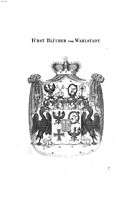
His collected writings and letters (together with those of Yorck and Gneisenau) appeared in 1932:
- Gesammelte Schriften und Briefe / Blücher, Yorck, Gneisenau, compiled and edited by Edmund Th. Kauer (Berlin-Schöneberg: Oestergaard, [1932])
His campaign journal covering the years 1793 to 1794 was published in 1796:
- Kampagne-Journal der Jahre 1793 und 1794 (Berlin: Decker, 1796)
A second edition of this diary, together with some of Blücher's letters, was published in 1914:
- Vorwärts! Ein Husaren-Tagebuch und Feldzugsbriefe von Gebhardt Leberecht von Blücher, introduced by General Field Marshal von der Goltz, edited by Heinrich Conrad (Munich: G. Müller, [1914])
Family
Blücher was married twice: in 1773 to Karoline Amalie von Mehling (1756–1791) and in 1795 to Amalie von Colomb (1772–1850), sister of General Peter von Colomb. By his first marriage he had seven children, two sons and a daughter surviving infancy.
Ancestry
| Ancestors of Gebhard Leberecht von Blücher | ||||||||||||||||||||||||||||||||||||||||||||||||||||||||||||||||||||||||||||||||||||||||||||||||||||||||||||||||||||||||||||||||||||||||||||||||||||||||||||||||||||||||||||||||||||||||||||||||||||||||||||||||||||||||||||||||||||||||||||||||||||||||||||||||||||||||||||||||||||||||||||||||||||||||||||||||||||||||||||||||||||||||||||||||||||||||||||||||||||||||||||||||||||||||||||||||||||||||||||||||||||||||||||||||||||||||||||||||||||||||||||||||||||||||||||||||||||||||||||||||||||||||||||||||||||||||||||||||||
|---|---|---|---|---|---|---|---|---|---|---|---|---|---|---|---|---|---|---|---|---|---|---|---|---|---|---|---|---|---|---|---|---|---|---|---|---|---|---|---|---|---|---|---|---|---|---|---|---|---|---|---|---|---|---|---|---|---|---|---|---|---|---|---|---|---|---|---|---|---|---|---|---|---|---|---|---|---|---|---|---|---|---|---|---|---|---|---|---|---|---|---|---|---|---|---|---|---|---|---|---|---|---|---|---|---|---|---|---|---|---|---|---|---|---|---|---|---|---|---|---|---|---|---|---|---|---|---|---|---|---|---|---|---|---|---|---|---|---|---|---|---|---|---|---|---|---|---|---|---|---|---|---|---|---|---|---|---|---|---|---|---|---|---|---|---|---|---|---|---|---|---|---|---|---|---|---|---|---|---|---|---|---|---|---|---|---|---|---|---|---|---|---|---|---|---|---|---|---|---|---|---|---|---|---|---|---|---|---|---|---|---|---|---|---|---|---|---|---|---|---|---|---|---|---|---|---|---|---|---|---|---|---|---|---|---|---|---|---|---|---|---|---|---|---|---|---|---|---|---|---|---|---|---|---|---|---|---|---|---|---|---|---|---|---|---|---|---|---|---|---|---|---|---|---|---|---|---|---|---|---|---|---|---|---|---|---|---|---|---|---|---|---|---|---|---|---|---|---|---|---|---|---|---|---|---|---|---|---|---|---|---|---|---|---|---|---|---|---|---|---|---|---|---|---|---|---|---|---|---|---|---|---|---|---|---|---|---|---|---|---|---|---|---|---|---|---|---|---|---|---|---|---|---|---|---|---|---|---|---|---|---|---|---|---|---|---|---|---|---|---|---|---|---|---|---|---|---|---|---|---|---|---|---|---|---|---|---|---|---|---|---|---|---|---|---|---|---|---|---|---|---|---|---|---|---|---|---|---|---|---|---|---|---|---|---|---|---|---|---|---|---|---|---|---|---|---|---|---|---|---|---|---|---|---|---|---|---|---|---|---|---|---|---|---|---|---|---|---|---|---|---|---|---|---|---|---|---|---|---|---|---|---|---|---|---|---|---|---|---|---|---|---|---|---|---|---|---|---|---|---|---|---|---|---|---|---|---|---|---|---|---|---|---|---|---|---|---|---|---|---|---|---|---|---|---|---|---|---|---|---|---|---|---|---|
| ||||||||||||||||||||||||||||||||||||||||||||||||||||||||||||||||||||||||||||||||||||||||||||||||||||||||||||||||||||||||||||||||||||||||||||||||||||||||||||||||||||||||||||||||||||||||||||||||||||||||||||||||||||||||||||||||||||||||||||||||||||||||||||||||||||||||||||||||||||||||||||||||||||||||||||||||||||||||||||||||||||||||||||||||||||||||||||||||||||||||||||||||||||||||||||||||||||||||||||||||||||||||||||||||||||||||||||||||||||||||||||||||||||||||||||||||||||||||||||||||||||||||||||||||||||||||||||||||||
Descendants
The marshal's grandson, Count Gebhard Bernhard von Blücher (1799–1875), was created Prince Blücher of Wahlstatt (Serene Highness), a hereditary title in primogeniture, the other members of his branch bearing the title count or countess. In 1832, he bought Raduň Castle in the Opava District and in 1847 the lands at Wahlstatt, Legnickie Pole, all of which remained in the family until the flight and expulsion of Germans from Poland and Czechoslovakia in 1945, which forced the family into exile in their mansion Havilland Hall in Guernsey, acquired by the 4th prince and his English wife, Evelyn, Princess Blücher. Later the family moved to Eurasburg, Bavaria. The present head of the House of Blücher von Wahlstatt is Nicolaus, 8th Prince Blücher of Wahlstatt (born 1932), the heir apparent is his son, hereditary count Lukas (born 1956).[11]
Legacy
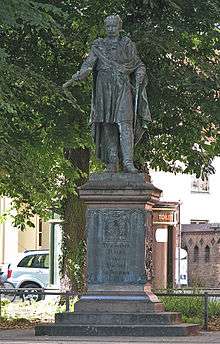
After his death, statues were erected to his memory at Berlin, Breslau, Rostock and Kaub (where his troops crossed the Rhine in pursuit of Napoleon's forces in 1813).
In gratitude for his service, George Stephenson, the pioneering British locomotive engineer, named a locomotive after him, and Oxford University granted him an honorary doctorate (Doctor of Laws), about which he is supposed to have joked that if he was made a doctor they should at least make Gneisenau an apothecary.
Three ships of the German navy have been named in honour of Blücher. The first to be so named was a corvette built at Kiel's Norddeutsche Schiffbau AG (later renamed the Krupp-Germaniawerft) and launched 20 March 1877. Taken out of service after a boiler explosion in 1907, she ended her days as a coal freighter in Vigo, Spain.
On 11 April 1908, the Panzerkreuzer SMS Blücher was launched from the Imperial Shipyard in Kiel. This ship was sunk on 24 January 1915 in the First World War at the Battle of Dogger Bank.
The Second World War German heavy cruiser Blücher was completed in September 1939, and pronounced ready for service on 5 April 1940 after completing a series of sea trials and training exercises. The vessel was sunk four days later near Oslo during the invasion of Norway.
He was played by German actor Otto Gebühr in the 1929 film Waterloo. In 1932 he was the subject of the biographical film Marshal Forwards in which he was played by Paul Wegener. It was part of a group of Prussian films released during the era.
When Krieblowitz was conquered by the Red Army in 1945, Soviet soldiers broke into the Blücher mausoleum and scattered the remains — despite the fact that Blücher had been instrumental in the final defeat of Napoleon, the would-be conqueror of Russia. Soviet troops reportedly used his skull as a football. After 1989, some of his profaned remains were taken by a Polish priest and interred in the catacomb of the church in Sośnica (German: Schosnitz), 3 km from the now Polish Krobielowice.[12]
He was portrayed by Soviet actor Sergo Zakariadze, in the 1970 Soviet-Italian film Waterloo.
Blücher is honoured with a bust in the Walhalla temple near Regensburg.
Blücher also has a boarding house named after him at Berkshire based Wellington College. The Blucher, as it is known, is a boys' house renowned for sporting and academic prowess.
A popular German idiom, ran wie Blücher ("charge like Blücher"), meaning that someone is taking very direct and aggressive action, in war or otherwise, refers to Blücher.
Vasily Blyukher's last name was given to his family by a landlord in honor of Gebhard.
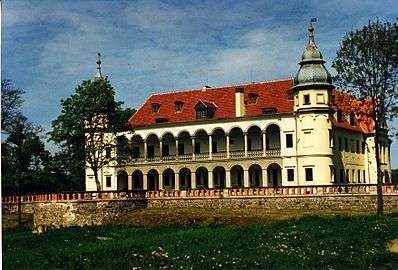 Krobielowice (German: Krieblowitz), Lower Silesia (owned by the Blücher family 1814-1945)
Krobielowice (German: Krieblowitz), Lower Silesia (owned by the Blücher family 1814-1945)- Raduň Castle, Czech Republic (owned by the Blücher family 1832-1945)
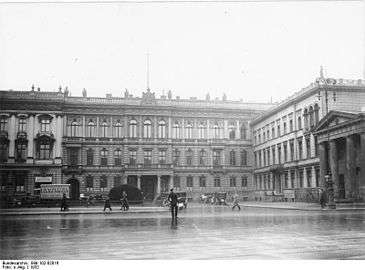 Blücher mansion near Brandenburg Gate (U.S. Embassy, 1930-1941)
Blücher mansion near Brandenburg Gate (U.S. Embassy, 1930-1941)- Blücher mausoleum, Krobielowice (2012)
See also
Notes
- ↑ Age of fourteen according to Chisholm 1911, p. 80.
- ↑ a life peerage meaning Prince of the Battlefield – after Wahlstatt monastery at Legnickie Pole, the site of the decisive Battle of Legnica (or Battle of Liegnitz; Legnickie Pole is the name created in 1948 for Wahlstatt or 'battlefield', a posthumous name more popular only from the 18th century: to avoid mix-up with the 1760 battle of Liegnitz on 9 April 1241 where the Mongols of the Golden Horde had defeated a Polish-German army but then retreated to the Mongol Empire, instead of invading the remainder of Europe all the way to the Atlantic Ocean.
- 1 2 3 4 5 6 7 Leggiere 2014, p. .
- 1 2 3 4 5 6 7 8 9 10 11 12 13 14 15 16 17 18 19 20 21 22 23 24 Chisholm 1911, p. 80.
- ↑ Polier 2016
- ↑ Lieven 2010, p. .
- ↑ Stanhope 1888, p. 119.
- ↑ Cornwell 2015, Chapter 6, p. 93–94?.
- ↑ Barbero 2006, p. .
- ↑ Cornwell 2015, Chapter 6, p. 94?.
- ↑ Cornwell 2015, Chapter 9, p. 158?.
- ↑ Cornwell 2015, Afterword p. 239?.
- ↑ Vítejte 2012
- ↑ Wroclaw.hydral.com.pl
References
- Barbero, A. (2006). The Battle: A New History of Waterloo. Translated by Cullen, John. Walker & Company.
- Cornwell, Bernard (2015). Waterloo: The History of Four Days, Three Armies and Three Battles. Lulu Press. p. front cover. ISBN 978-1312925229. — The pages numbers are given as offsets in the electronic view, these will vary from the page numbers in a physical book
- Leggiere, Michael V. (2014). Blucher: Scourge of Napoleon. University of Oklahoma Press.
- Lieven, Dominic (2010). Russia Against Napoleon: The True Story of the Campaigns of War and Peace. Penguin. ISBN 1101429380.
- Polier, Christoph Graf von (2016). "Gebhard Leberecht Blücher von Wahlstatt". Geneanet. Retrieved 5 May 2016.
- Stanhope, Phillips Henry (1888). Notes of conversaciones with the Duke of Wellington, 1831–1851. New York: Da Capo Press. p. 119.
- "Blücher von Wahlstatt family tree". Vítejte. 3 March 2012. Retrieved 5 May 2016.
Attribution
 This article incorporates text from a publication now in the public domain: Chisholm, Hugh, ed. (1911). "Blücher, Gebhard Leberecht von". Encyclopædia Britannica. 4 (11th ed.). Cambridge University Press. p. 80.
This article incorporates text from a publication now in the public domain: Chisholm, Hugh, ed. (1911). "Blücher, Gebhard Leberecht von". Encyclopædia Britannica. 4 (11th ed.). Cambridge University Press. p. 80.
Further reading
- Blücher (1932). Memoirs of Prince Blücher. Translated by Chapman-Huston, Desmond. London: Murray. OCLC 2231133.
- Crepon, Tom (1999). Gebhard Leberecht von Blücher: sein Leben, seine Kämpfe. Rostock: Hinsdorff. ISBN 3-356-00833-1.
- Gneisenau, August Wilhelm Anton, Graf Neidhardt von (1815). The life and campaigns of Field-Marshal Prince Blücher of Wahlstatt. Translated by Marston, James Edward. London: Sherwood, Neely and Jones. OCLC 681606658.
- Henderson, Ernest F. (1994). Blücher and the uprising of Prussia against Napoleon, 1806–1815. Aylesford: R.J. Leach. ISBN 1-873050-14-3.
- Parkinson, Roger (1975). The Hussar general: the life of Blücher, man of Waterloo. London: P. Davies. ISBN 0-432-11600-1.
External links
| Wikimedia Commons has media related to Gebhard Leberecht von Blücher. |
- Blüchers Zug von Auerstedt bis Ratekau und Lübecks Schreckenstage (1806) – German publication about Blücher
-
 "Blücher, Gebhard Leberecht von". Encyclopædia Britannica. 3 (9th ed.). 1878. This source gives “Black Hussars” for the name of his old regiment.
"Blücher, Gebhard Leberecht von". Encyclopædia Britannica. 3 (9th ed.). 1878. This source gives “Black Hussars” for the name of his old regiment.